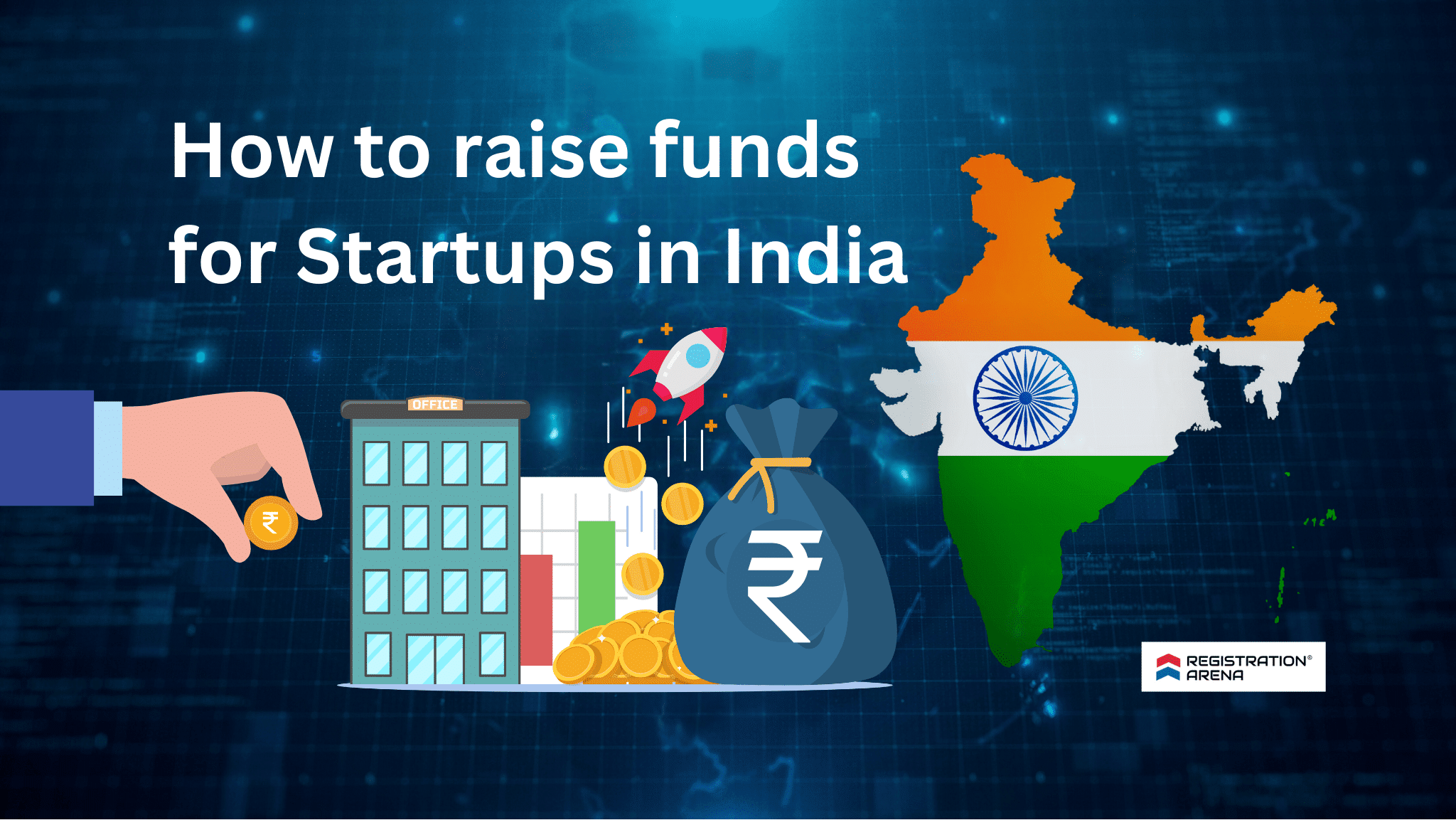India is emerging as a hub of entrepreneurship and innovation. Startup culture is flourishing like never before owing to increased demand for innovative products and services. One of the factors that plays a pivotal role in determining the success of the start-up is the raising of funds and its proper deployment. There are many options available for startup business funding in India such as Angel investors, crowdfunding, government schemes, etc. but it is necessary to analyze their pros and cons before raising funds from them. In this article, we will discuss in detail how to raise funds for startup business in India and the different stages of startup funding.
First, let us understand the meaning of startup and the eligibility criteria for the Startup India scheme.
What is a Startup?
A startup is a newly formed business venture that focuses on innovation, scalability, and meeting a specific need or market demand. Generally, startups operate with limited financial resources and are led by a small team of entrepreneurs. They frequently use technology in their efforts to disrupt established industries or introduce new solutions.
Some of the examples of successful startups in India in different sectors are Cred, Swiggy, Meesho, Cult Fit, etc.
Why Do Startups Require Funding?
Before raising funds, a business must ascertain the need for funds. The following are the purposes for which startups generally require funding.
Product Development

Startups generally offer innovative products in the market. Therefore, they require funds for research and development, product design, prototype creation, etc.
Infrastructure

Those startups that manufacture products require physical infrastructure such as buildings, machinery, and other production facilities. Therefore, they require a large amount of funds to finance infrastructure.
Raw Material and Equipment

Most of the startups are engaged in the production of physical goods and therefore they require funds to buy raw materials and equipment. However, this cost depends on the type of product and the scale of operations on which the startup is planning to operate.
Working Capital

Apart from the initial cost of setting up, startups also require funds for the business’s day-to-day expenses and cash flow management. In simple words, they need funds for working capital financing.
Hiring Talent

Most of the startups are technology-driven and require highly skilled engineers and software developers to create and improve the products. Such experts generally demand competitive compensation and therefore startups require funds to hire and compensate them.
Marketing and Sales

Startups often compete with well-established organizations in the industry. Therefore, they need to spend heavily on marketing and promoting their products to generate revenue and establish themselves in the market.
Legal and IPR Cost

To take benefit of the Startup India Scheme, startups are required to legally register themselves which involves consultant fees, government fees, documentation, etc.
Additionally, startups offer innovative products that require patent or copyright registration for protection. Therefore, they need funds for legal and Intellectual Property Rights (IPR) expenses.
Expansion

Initially, startups operate at a small scale but if their product or service is successful, they start expanding to new markets or regions. Therefore, they need funds to expand business operations.
Different Stages of Startup Funding
The source of funding from which a startup should raise funds should be selected considering the stage at which the startup is operating. Typically, the following are the 5 stages of startup funding.
Pre-Seed Stage
This is the first stage of startup funding where the entrepreneurs have an idea and they are working on its implementation. At this stage, startups require less amount of funds and there are very limited sources from which they can raise funds.
Seed Stage
This is the second stage of startup funding in which it is ready with the prototype (sample product) and needs to test the product or service in the market. It is known as ‘Proof of Concept (POC)’ and if it is successful, the startup launches its product/service in the market.
At this stage, the startup requires more funding for trials, talent hiring, testing, etc. Further, more funding options are available at this stage compared to the previous one.
Series A Stage
At this stage, the startup has already launched its product/ service in the market and therefore it plans to grow the consumer base, diversify its offerings, expand to new regions, etc.
As product testing has already been done and performance can be measured through metrics like revenue, customer base, app downloads, etc., startups can approach more formal and recognized sources of funding at this stage.
Series B, C, D & E
This is the fourth stage of startup funding in which it experiences an increase in revenue and faster market growth. At this stage, entrepreneurs look for growth in their business through market penetration and other expansion strategies for which large amounts of funds are required.
Exit Stage
This is the last stage of startup funding in which it plans to convert itself into a big and established company. It is done through listing of shares or merger/acquisition with/by another company. Examples are Paytm, Zomato, etc.
Sources of Funding for Startups
Now that we have understood the different purposes for which startups raise funds and the stages of funding, let us discuss how to get investment for startups in India.
The following are the different sources from which a startup can raise funds.
Bootstrapping

Bootstrapping a startup means self-funding and relying on personal savings for growth, without significant external investment. It is often the initial choice for many entrepreneurs, offering financial independence and control over their business. Examples of bootstraped companies are zerodha, images bazaar, etc.
Additionally, there are no obligations of repaying loans or surrendering equity to external investors.
Family & Friends

Borrowing money from family and friends is another common channel of funding for startups during the pre-seed stage. A key advantage of this source is the establishment of a mutual understanding between the startup founders and the investors.
Loan from Banks, NBFC, MFIs

Obtaining loans from banks, Non-Banking Financial Companies (NBFCs), Micro-Finance Institutions (MFI), etc. is a viable option during the Series A stage as the startups can show their market traction and revenue-generating ability.
This is particularly advantageous for managing working capital. Further, opting for debt can be attractive to entrepreneurs as it avoids equity dilution, thereby preserving their ownership stakes.
However, this option needs to be weighed for its pros and cons since the rate of interest being paid in this option can derail the operations of the startup if there are not adequate sources of revenue generation from the business model being carried by the start-up.
Government Loan Schemes or Grants

Under the Startup India initiative, the government has introduced several schemes for startups in India. For example, the Startup India Seed Fund Scheme and SIDBI Fund of Funds that access to low-cost capital to aspiring entrepreneurs that too without the requirement of collateral.
These initiatives aim to facilitate the growth of innovative startups and foster economic development. Moreover, this fundraising source is for the seed stage.
Crowdfunding

Another source of funding that is suitable for the seed stage is Crowdfunding. It means gathering modest contributions from numerous individuals, commonly facilitated through online crowdfunding platforms. This approach leverages the collective power of the crowd to provide financial support to startups.
However, this concept is more prevalent in Western countries and still at a nascent stage in India.
Angel Investors

Angel investors are private individuals who invest their capital in promising startups during their seed stage in exchange for ownership stakes. You can connect with angel investors through established angel networks like the Indian Angel Network, Mumbai Angels, Lead Angels, Chennai Angels, etc.
Venture Capital Funds or Venture Debt Funds

Venture capital (VC) funds are managed by professionals and focus on high-growth startups. Each VC fund has specific criteria, including sector preference, startup stage, and funding size, which should match your startup’s profile. VCs invest in startups in exchange for equity and often offer guidance.
Venture debt funds are private investment funds that primarily provide startups with debt-based financing, usually in conjunction with an angel or VC funding round. However, they generally invest during the Series A stage.
Examples are Sequoia Capital, Lightspeed Venture Partners, etc.
Private Equity or Investment Firms

Private equity and investment firms are financial institutions that manage and invest money on behalf of their clients. They generally avoid funding startups, however, as per the recent trend, some of these firms are extending financial support to rapidly advancing late-stage startups with a solid track record of sustained growth.
Examples are Kotak Private Equity, ICICI Venture Fund, etc.
Initial Public Offer (IPO)

IPO, or Initial Public Offering, means the listing of the shares of the startup on a recognized stock exchange. It is done to raise funds from the public and to provide an exit opportunity to early-stage investors.
However, it is a complex process and involves various legal requirements, making it a choice typically pursued by startups demonstrating significant profitability and steady growth.
Incubators

Another source of startup funding that is suitable for the seed stage is incubators. Incubators are established to support entrepreneurs in the creation and launch of their startups. Most educational institutions offer this service through their incubation cell for budding entrepreneurs.
These organizations provide valuable services, including office space, utilities, administrative and legal aid, along with the possibility of granting financial support through debt or equity investments.
Steps to Raise Funds for Startup Business
Fundraising is a complex process that requires proper planning and careful implementation. The following are the steps that startups should follow to raise funds successfully.
Assessment of Funding Needs
Firstly, a startup should evaluate its funding needs and determine the appropriate amount to raise. It should create a milestone-based plan outlining its goals for the next 1, 5, and 10 years. Planning for expenses like production, prototype development, and research is crucial.
This analysis will guide decisions about the next round of investment. Also, the assessment shall be properly done so there is no unnecessary burning of the cash of the investors.
Assessment of Investment Readiness
Recognizing the funding needs is crucial, but it’s equally vital to assess the startup’s readiness for fundraising. Investors seek convincing revenue projections, profitability, market position, uniqueness, and a dedicated team. Therefore, in this step, startups should assess whether they are ready for investment or not.
Preparation of Pitch Deck
A pitch deck is a brief and visually engaging presentation that summarises a business idea and highlights its market potential, value proposition, and growth strategy. It is an instrument through which a business communicates with its potential investors.
Therefore, the preparation of a pitch deck is another important step in the fundraising process.
Convince your investors with our captivating pitch deck designs! Contact us today.
Identification of Source of Funding
Considering the requirement and stage of funding, identify the appropriate source of funding. There are several sources from which a startup can raise funds as outlined above.
Due Diligence
Angel networks and Venture Capitalists engage in rigorous due diligence before formalizing equity deals. They scrutinize the financial decisions taken by the startup in the past, the team’s qualifications, background, etc.
This diligence validates the startup’s growth claims, market data, and helps preempt any concerning activities. Upon successful due diligence, funding is executed as per agreed terms.
Problems Faced by Startups in Raising Funds
Fundraising is a challenging process. Startups encounter several problems while trying to get funds for their business. Following are some common problems that startups face in raising funds.
Unproven Business Model
First for any venture to be successful it needs to identify the right market fit and they kind of consumers it will be serving by providing its products and services.
Unproven business models make it difficult for startups to raise money. Investors perceive them as risky without evidence, so they must demonstrate their ability to generate revenue through market research and testing.
Lack of Track Record
Without a successful history or track record, investors are hesitant to support startups, which damages credibility. Investor’s aversion to risk makes it difficult to establish reasonable valuations and secure funding.
Competition for Limited Funds
Due to intense competition, raising capital for a startup is challenging, especially for early-stage businesses. Investors’ demands for a track record present challenges for beginners. Additionally, this competition may increase startup valuations, raising the cost of funding and diluting ownership.
Underestimation of Funding Needs
Underestimating the early funding requirements can pose significant challenges for startups. Lack of capital hampers important processes like marketing, hiring, and product development, which further restricts the company’s expansion and overall performance.
Selection of Appropriate Source of Funding
The selection of an appropriate source is crucial for successful fundraising. There are several sources with their own advantages and disadvantages and making the wrong choice can have serious repercussions.
For example, pursuing venture capitalists when the startup is not ready for it may result in loss of control and premature dilution of equity.
Startup India Scheme of the Government of India
In 2016, the Government of India launched the ‘Startup India Scheme’ to support startups in India. Under this scheme, the government provides various incentives and benefits to eligible startups that are recognized by the Department for Promotion of Industry and Internal Trade (DPIIT).
Following is the eligibility criteria for Startup India Registration –
- Type of Entity – The startup should be registered as a Private Limited Company or a Limited Liability Partnership or a Partnership Firm.
- Age of the Entity – The age of the entity should not be more than 10 years from the date of its registration.
- Annual Turnover – The annual turnover of the entity should not exceed Rs. 100 crores in any of the financial years from its registration.
- Original Entity – The entity should not be formed by reconstruction or splitting up of an existing business.
- Innovation and Scalability – The entity should work for the improvement or development of a process/product/service or have a scalable business model.
Are you looking for a reliable service provider to register your startup? Look no further! Connect with our experts today and register your startup easily.







